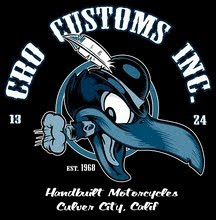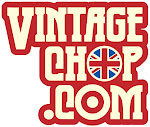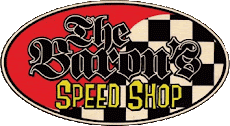Spent yesterday afternoon at Pantherista HQ, which also happens to be the homestead of Sumo, the head honcho at Vintage Chop.com. Panthershaun from Dirty Bobbers and Brit Chopper was also in attendance, they were playing a strange game of Panther Lego, this is a hobby particularly enjoyed by the strange breed of people that hold all things Panther dear. Shaun has got hold of a set of very '70s custom springers which must be 10 or 12 inch overs (over what? is one of those timeless mysteries) and they were hanging bits together in some sort of mock up ritual. I have got a couple of pix of the completed, Chimera/Frankenstein beast that they ended up with, and may I add seemed very pleased with, but I will let them publish first as to beat them to the punch is not really cricket.

However this bike is living in Sumo's hallway and will give you some idea of what they get up to at these wild an' wayward wrenching sessions. This is going to be a lovely little bike, the photo doesn't really show how small it all is. The huge presence of motor really dominates the rest of the bike. The repop stock length springers also go a long way to shortening and reducing the rolling chassis, to make the engine look even bigger.
For those out there who are not familiar with the idiosyncratic Panther,here is the opening paragraph from the Owners Club website.
Panther motorcycles were manufactured in Cleckheaton, Yorkshire, UK from 1900 to 1967. The most famous models are big (~600cc) "slopers" which, myth has it, fire once every lamp-post. Promoted as "The Perfected Motorcycle" they were noted for innovation for most of their history. Panthers were often used for hauling sidecars. The combination of the advent of cheap motorcars and the collapse of the British motorcycle industry brought production to an end. They are simple and fairly robust machines which enspire enormous, some might say obsessive, enthusiasm in their owners. These factors, combined with relatively low cost, have resulted in a fair number of Panthers being still in use and few concours museum pieces. A "practical classic" and a great bike to ride and tinker with.
Panther motorcycles were manufactured in Cleckheaton, Yorkshire, UK from 1900 to 1967. The most famous models are big (~600cc) "slopers" which, myth has it, fire once every lamp-post. Promoted as "The Perfected Motorcycle" they were noted for innovation for most of their history. Panthers were often used for hauling sidecars. The combination of the advent of cheap motorcars and the collapse of the British motorcycle industry brought production to an end. They are simple and fairly robust machines which enspire enormous, some might say obsessive, enthusiasm in their owners. These factors, combined with relatively low cost, have resulted in a fair number of Panthers being still in use and few concours museum pieces. A "practical classic" and a great bike to ride and tinker with.

A standard rigid Model 100 Panther, an object of lust for The Pantherista
















































-25.jpg)










.jpg)




















































Good to meet you sir, I will try and do that mock-up today and get some pictures.
ReplyDelete